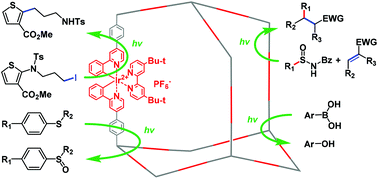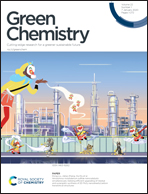Iridium complex-linked porous organic polymers for recyclable, broad-scope photocatalysis of organic transformations†
Abstract
Two rigid porous organic polymers (Ir-POP-1 and Ir-POP-2) were prepared from the coupling reactions of tetraphenylmethane tetraborate and two [Ir(ppy)2(dtbbpy)]+-based bitopic linkers and applied as heterogeneous visible-light photocatalysts for organic transformations. Ir-POP-2 was found to exhibit high catalytic activity for a wide range of organic reactions, which include Smiles–Truce rearrangement of alkyliodides, desulfurative conjugate addition to Michael acceptors, and aerobic oxidations of sulfides and arylboronic acids. For all the transformations, Ir-POP-2 could achieve heterogeneous photocatalytic efficiency that rivals that of the homogeneous prototype iridium complexes. This remarkably high photocatalytic performance has been attributed to the large pore size of the conjugated backbone. The new heterogeneous photocatalyst was also highly stable to achieve good recyclability for all the studied reactions and could be reused eight to nineteen times.



 Please wait while we load your content...
Please wait while we load your content...